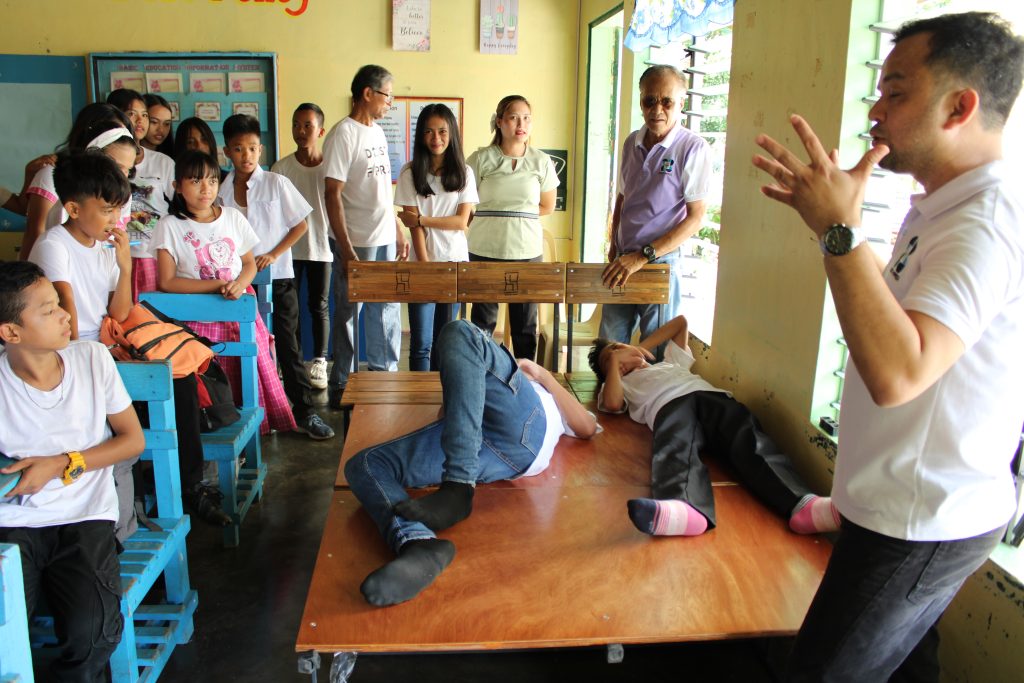By Heherson P. Valdez
Two Filipino inventions, Silyang Pinoy and Make-roscope, are making waves in the education sector as part of a lineup of inventions from the Philippines set to compete at the 2024 Seoul International Invention Fair (SIIF). These inventions symbolize the country’s growing talent pool of inventors, with Silyang Pinoy enhancing disaster resilience in schools and Make-roscope science education accessibility. As they take center stage at SIIF 2024, these inventions highlight the potential of Filipino innovators to make a global impact.
- Silyang Pinoy: A Filipino Invention Enhancing Disaster Resilience
In times of calamity, classrooms in the Philippines are often converted into evacuation centers, but their limited facilities fail to provide comfort for evacuees. This pressing issue inspired a team of innovators at the Department of Science and Technology – Forest Products Research and Development Institute (DOST-FPRDI) to create Silyang Pinoy, a multifunctional school furniture that serves as both a chair and a bed frame.
Crafted with sustainability and practicality in mind, this invention exemplifies Filipino ingenuity and the commitment to addressing real-world challenges through innovation.
Silyang Pinoy is the brainchild of a diverse team of inventors: Engr. Edward Paul S. Marasigan, Loreto A. Novicio, Chris Johnniel France Rana, Victor G. Revilleza, Precious Lynne S. Payuan. Calixto T. Calulo. Rafael D. Sungcaya, and Eduardo M. Atienza. Their combined expertise reflects a shared dedication to solving problems that impact both local communities and the environment.
Engr. Edward Paul S. Marasigan, a Senior Science Research Specialist at DOST-FPRDI, emphasized the importance of purpose-driven innovation:
“Every research idea arises from a specific problem. For Silyang Pinoy, it was the lack of decent sleeping accommodations in classrooms converted into shelters during disasters. This challenge drove us to design something practical yet impactful.”
Marasigan credits his background in Mechanical and Agricultural Engineering for shaping his innovative approach. He noted that his role at DOST-FPRDI has provided the resources and guidance needed to bring ideas to life.
Functionality meets sustainability in times of calamity
The Silyang Pinoy stands out not just for its dual functionality as a chair and bed frame but also for its commitment to environmental sustainability. Made primarily from bamboo—a renewable and eco-friendly resource—the furniture is a testament to the potential of sustainable materials in modern design.
“Silyang Pinoy isn’t just about functionality; it’s about addressing disaster resiliency while promoting the use of sustainable materials,” Marasigan shared.
The prototype underwent rigorous testing for strength, durability, and usability, passing with flying colors. Students who tested the design expressed amazement at its practicality and versatility, validating the team’s vision.
The development of Silyang Pinoy was made possible through the support of DOST-FPRDI. The institute provided not only the technical resources but also a collaborative environment that nurtured the inventors’ creativity.
“DOST-FPRDI played an instrumental role in turning this idea into reality. Their intervention ensures that technologies like Silyang Pinoy can make a real difference in our communities,” Marasigan said.
Meanwhile, the DOST-TAPI’s funding and support in showcasing Silyang Pinoy internationally underline the importance of promoting homegrown innovations. “We hope to leverage the exposure from SIIF to connect with investors and partners who can help bring Silyang Pinoy to communities worldwide,” Marasigan added.
A vision for the future
Looking ahead, the inventors envision Silyang Pinoy as a staple in schools and communities nationwide, enhancing disaster readiness while promoting sustainable practices.
Marasigan reflects on his professional journey with a sense of purpose:
“Success, for me, is making a meaningful impact through my work. I hope to inspire the next generation of engineers and researchers to innovate with purpose and resilience.”
As the team prepares to present Silyang Pinoy on the global stage, they carry with them a message of pride and possibility—that Filipino innovation can compete and thrive internationally.
- Make-roscope: Making Science Lab Accessible & Affordable
In a world where innovation often seems out of reach for many, Jeremy De Leon, a Manufacturing Engineering graduate from Mapúa University, is rewriting the narrative. With a keen eye for problem-solving and a heart set on making science education accessible, De Leon has developed the Make-roscope, a pocket-sized, smartphone-compatible microscope transforming how students and educators explore science.
Growing up in a community with limited resources, De Leon was inspired to create tools that bridge the gap between curiosity and accessibility. “I really just want to make science more reachable for everyone,” he shared. His journey as an inventor has been shaped by his upbringing and a network of mentors, including those from the Leaders in Innovation Fellowship at the Royal Academy of Engineering. “They taught me how to protect my inventions and bring them to the people who need them the most,” he said.
The Make-roscope: A simple solution to a complex problem
The Make-roscope addresses a critical issue in science education—access to proper laboratory tools. Designed to be both affordable and user-friendly, it attaches to any smartphone, using its camera to magnify objects for exploration. Whether it’s observing plant cells or examining soil samples, this invention enables hands-on learning without the need for expensive, bulky equipment.
De Leon recalls the first time the Make-roscope was tested in a classroom: “The students’ excitement was contagious. Watching them explore and discover made me realize this was more than just a product—it was a tool to spark curiosity and learning.”
To date, over 8,500 units have been distributed to schools, and the feedback has been overwhelmingly positive. Teachers commend its portability and affordability, while students are captivated by its ability to make science tangible and interactive.
The journey from concept to reality was not without challenges, but the support from the Department of Science and Technology-Technology Application and Promotion Institute (DOST-TAPI) played a crucial role. “Their funding and technical assistance were instrumental,” De Leon notes. “They gave me the confidence to push forward and make this idea a reality.”
DOST-TAPI’s intervention also facilitated De Leon’s participation in international platforms, amplifying the Make-roscope’s reach and impact. “Agencies like DOST-TAPI help showcase Filipino innovations on the global stage, which offers a great opportunity for my fellow inventors, to build our country’s reputation in science and technology,” he added.
A legacy of accessible innovation
Looking ahead, De Leon dreams of classrooms across the Philippines—and beyond—equipped with the Make-roscope. His ultimate goal? To inspire the next generation of Filipino innovators. “I want to show that innovation doesn’t have to be complicated or expensive. It can be simple, practical, and accessible to everyone,” he said.
Through his work, De Leon is proving that ingenuity knows no boundaries. The Make-roscope stands as a testament to the power of creativity, perseverance, and a commitment to making a difference—one microscope at a time.
Onward to the global stage: SIIF 2024
Marasigan hopes to leverage the exposure to attract partnerships and investors, accelerating the commercialization of Silyang Pinoy and expanding its impact. “We’re excited to showcase Silyang Pinoy to a global audience. This is a chance to promote Filipino ingenuity and demonstrate how our solutions can address global challenges,” Marasigan expressed.
Meanwhile, De Leon envisions new opportunities for growth and collaboration for Make-roscope. “It’s an honor to be part of this event. I’m looking forward to connecting with potential partners and investors who share the vision of making science accessible to all,” he said.
With plans to scale production, enhance features, and expand into new markets, De Leon sees the SIIF as a stepping stone to greater impact. “This is more than just an invention; it’s a movement to democratize science education,” he emphasized.
Silyang Pinoy and Make-roscope are not just carrying practical solutions that can solve community problems, but also the pride of Filipino ingenuity. These inventions are set to prove that the Philippines can compete and thrive in the global innovation landscape.
The SIIF 2024 presents a unique opportunity to elevate Filipino inventors on the world stage, fostering collaborations that could amplify the impact of these technologies worldwide. As the nation cheers for its trailblazing inventors, their participation reinforces DOST’s broader mission: solidifying the Philippines’ reputation as a global leader in science, technology, and innovation.
** This article is part of the “SPICE: Science and Technology Promotion for International Contest and Exhibits” campaign for the Seoul International Invention Fair – SIIF 2024. For more information and event updates, please visit the DOST-TAPI website at www.tapi.dost.gov.ph.**




